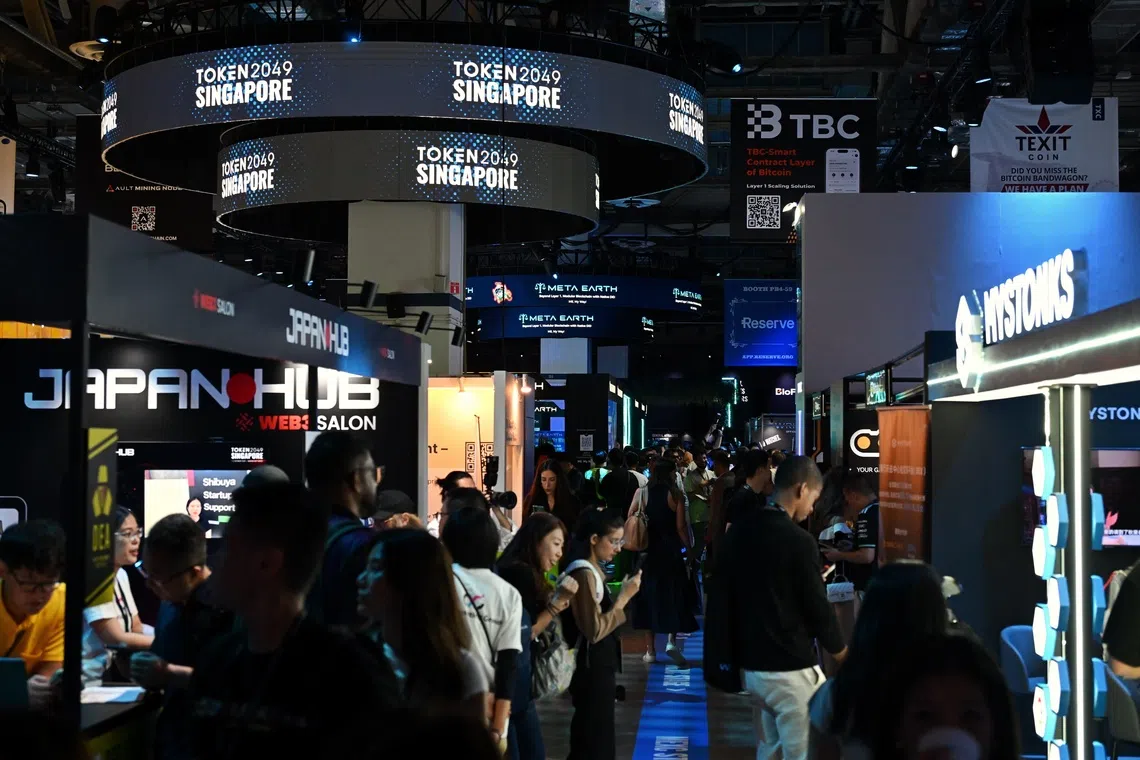The ‘crypto bros’ are still partying, but builders in Singapore haven’t slept either
Sign up now: Get ST's newsletters delivered to your inbox

People attending Token2049, Singapore’s largest crypto conference, at the Marina Bay Sands Expo and Convention Centre on Oct 1.
ST PHOTO: KUA CHEE SIONG
Follow topic:
SINGAPORE – A massage room, a pickleball court, a cold plunge pool and a tattoo parlour.
These were some of the attractions at a recent cryptocurrency conference in Singapore, attended by the likes of Formula One veteran Fernando Alonso, former Chelsea and England captain John Terry, and a mascot in an astronaut suit.
They were among 25,000 other crypto bros – and a few girls – who flew in from around the world to attend 2025’s Token2049, Singapore’s largest crypto conference, which was held across five floors of the Marina Bay Sands Expo and Convention Centre on Oct 1 and 2.
“Crypto bro” – usually a young, male crypto enthusiast – is an industry term used to describe those who loudly champion crypto as the future of money. These individuals are often associated with high-risk trading and flashy wealth.
As participants traded views on topics such as stablecoins, institutional adoption and tokenisation, the conference took on a celebratory vibe, or in crypto parlance, “degen”, reflecting the unabashed optimism and high-risk enthusiasm that have propelled blockchain and cryptocurrency from niche ideas to global prominence.
The fanfare comes amid a rebound in crypto prices, with Bitcoin skyrocketing more than 90 per cent over the past year, lifted by the launch of Bitcoin exchange-traded funds, growing institutional interest and pro-crypto policies in the US.
The world’s largest cryptocurrency by market value is now trading at record highs above US$125,600 (S$162,000).
But Token2049’s party-like atmosphere belied the fact that crypto is still a young industry under growing regulatory scrutiny in Singapore.
Mr Darius Sit, founder of digital asset trading firm QCP Capital, described the crypto bro culture seen at 2025’s Token2049 as “a temporary, concentrated phenomenon”.
“What we’re seeing is the global crypto circus coming to town, a vibrant and necessary part of the industry calendar that brings together every subculture, including the loud, speculative ‘bro’ element,” he said.
But this is not representative of Singapore’s day-to-day reality, Mr Sit said, adding that the Monetary Authority of Singapore (MAS) has been “surgically precise” in its regulations.
“The laws are not designed to kill crypto, but specifically to excise the speculative, retail-facing crypto bro culture from the domestic market while actively cultivating a sober, institutional environment,” he said.
He noted that MAS’ regulations act as a filter in restricting retail advertising and get-rich-quick narratives, while establishing a licensing framework that attracts serious, well-capitalised global players.
“Token2049 is just an annual party – the rest of the year is about building institutional-grade finance in a strictly regulated sandbox,” he said.
The latest regulations on cryptocurrencies in Singapore,
Digital payment tokens include cryptocurrencies like Bitcoin, while tokenised capital market products are digital representations of securities such as stocks or bonds.
The regulator noted that it has set the bar high for licensing, and will generally not issue a licence to such providers serving overseas customers.
Not everyone in the local industry appreciated being associated with the crypto bro culture, with some participants pushing back against the label.
Mr Saad Ahmed, head of Asia-Pacific at cryptocurrency exchange Gemini, said the term “crypto bro” is not a fair characterisation as there are many talented people from different backgrounds who are working in the industry.
“We might be fun and quirky, but we’re also doing real work,” he said.
Ms Amy Zhang, head of Asia-Pacific at digital asset infrastructure provider Fireblocks, said the “crypto bro” culture may resurface at headline events like Token2049, but Singapore’s crypto industry has moved past such stereotypes.
She pointed to the Republic’s stablecoin regulatory framework as an example of how the environment here has become more mature.
“Institutions are looking beyond the speculation associated with crypto bro culture to focus on practical use cases in payments, settlement and tokenisation – positioning Singapore as a credible hub for things like stablecoin issuance and cross-border payments,” she said.
One example is the Singapore dollar-backed stablecoin, XSGD,
XSGD is pegged one-to-one against the Singapore dollar, and is fully backed by reserve assets held at DBS Bank and Standard Chartered Bank.
On Sept 30, cryptocurrency exchange OKX launched a service allowing its customers to make payments in stablecoins to merchants on Grab in Singapore for the first time.
Payments done using USDC or USDT stablecoins through the service, called OKX Pay, will first be converted to XSGD, after which merchants will receive the amount in Singapore dollars.
Ms Gracie Lin, chief executive of OKX Singapore, said the industry here has grown, with more professionals – including women – helping to make it more “institutional, disciplined and diverse”.
“Singapore is uniquely positioned because it’s a hub for both traditional finance and digital assets, and, of course, stablecoins are the bridge between the two,” she said.
Other developments to look out for as Singapore’s crypto industry continues to mature include the tokenisation of real-world assets such as real estate, art and commodities, and deploying artificial intelligence (AI) to detect fraud or money laundering on the blockchain.
QCP’s Mr Sit noted that Singapore is emerging as a global leader in tokenisation, driven by the MAS’ “proactive” stance.
MAS is “bringing together financial giants to test the tokenisation of real-world assets in a regulated framework. Banks have successfully tested the tokenisation of assets like foreign exchange and government bonds, while asset managers are exploring tokenised money market funds”, he said.
Meanwhile, blockchain analytics companies in Singapore have also started using AI and advanced algorithms to track illegal or suspicious cryptocurrency transactions.
Ms Lin said AI can make the crypto industry faster and smarter, strengthening controls like fraud detection, compliance monitoring and tokenisation audits.
“Still, it should never replace human judgment or governance. Singapore’s edge lies in combining advanced technology with trusted oversight, and that balance is what keeps the crypto industry safe and credible,” she added.
Mr Hassan Ahmed, country director of Coinbase Singapore, said digital assets deserve support similar to that given to AI.
In Budget 2025, for example, the Government committed $150 million under the Enterprise Compute Initiative to help firms adopt AI.
“It should be a parallel for digital assets – they deserve similar support,” said Mr Ahmed.
“With targeted initiatives, Singapore can strengthen its position as a hub for both traditional finance and digital assets, and keep pace with other jurisdictions shaping the future.”


